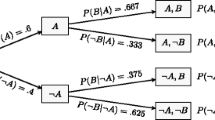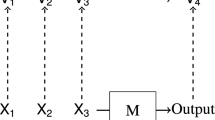Abstract
This paper presents a new account of Hume’s “probability of causes”. There are two main results attained in this investigation. The first, and perhaps the most significant, is that Hume developed – albeit informally – an essentially sound system of probabilistic inductive logic that turns out to be a powerful forerunner of Carnap’s systems. The Humean set of principles include, along with rules that turn out to be new for us, well known Carnapian principles, such as the axioms of semiregularity, symmetry with respect to individuals (exchangeability), predictive irrelevance and positive instantial relevance. The second result is that Hume developed an original conception of probability, which is subjective in character, although it differs from contemporary personalistic views because it includes constraints that are additional to simple consistency and do not vary between different persons. The final section is a response to Gower’s thesis, by which Hume’s probability of causes is essentially non-Bayesian in character. It is argued that, on closer examination, Gower’s reading of the relevant passages is untenable and that, on the contrary, they are in accordance with the Bayesian reconstruction presented in this paper.
Similar content being viewed by others
REFERENCES
Beauchamp, T. L., and T. A. Mappes: 1975, 'Is Hume Really a Sceptic About Induction?', American Philosophical Quaterly 12, 119–29.
Bernoulli, D.: 1738, 'Specimen theoriae novae de mensura sortis', Commentarii Acad. Sc. Imperialis Petropolitanae 5, 175–192. English translation by C. G. Allen in Biometrika 48, 3–13, 1961.
Bernoulli, J.: 1713, Ars Conjectandi, Thurnisiorum, Basil.
Carnap, R.: 1952, The Continuum of Inductive Methods, University of Chicago Press, Chicago.
Carnap, R.: 1962, Logical Foundations of Probability (2nd ed.), University of Chicago Press, Chicago.
Carnap, R.: 1963, 'An Axiom System for Inductive Logic', in P. A. Schilpp (ed.), The Philosophy of Rudolf Carnap, The Open Court Publishing Co., La Salle.
Carnap, R.: 1971, A Basic System of Inductive Logic, Part 1, in R. Carnap and R. C. Jeffrey (eds.), Studies in Inductive Logic and Probability, vol. 1, University of California Press, Berkeley, 33–165.
Cowie, A. P. (ed.): 1989, Oxford Advanced Learner's Dictionary of Current English, 4th edition, Oxford University Press, Oxford.
Cox, R. T.: 1961, The Algebra of Probable Inference, The Johns Hopkins Press, Baltimore.
de Finetti, B.: 1931, 'Funzione caratteristica di un fenomeno aleatorio', Atti della reale accademia nazionale dei lincei: Memorie della classe di scienze fisiche, matematiche e naturali 4 (6th series), 86–133.
de Finetti, B.: 1937, 'La prévision: ses lois logiques, ses sources subjectives', Ann. de l'Inst. Henri Poincaré 7, 1–68.
Fogelin, R. J.: 1985, Hume's Skepticism in the Treatise of Human Nature, London, Routledge & Kegan Paul.
Gaifman, H.: 1971, 'Applications of de Finetti's Theorem to Inductive Logic', in R. Carnap and R. C. Jeffrey (eds.), Studies in Inductive Logic and Probability, vol. 1, University of California Press, Berkeley, 235–251.
Good, I. J.: 1950, Probability and the Weighing of Evidence, Griffin, London.
Gower, B.: 1990, 'David Hume and the Probability of Miracles', Hume Studies 16, 17–31.
Gower, B.: 1991, 'Hume on Probability', British Journal for the Philosophy of Science 42, 1–19.
Humburg, J.: 1971, 'The Principle of Instantial Relevance', in R. Carnap and R. C. Jeffrey (eds.), Studies in Inductive Logic and Probability, vol. 1, University of California Press, Berkeley, 225–233.
Hume, D.: 1902, Enquiries Concerning Human Understanding and Concerning the Principles of Morals, ed. by L. A. Selby-Bigge (2nd ed., reprint 1961), Clarendon Press, Oxford.
Hume, D.: 1978, A Treatise of Human Nature, ed. by L. A. Selby-Bigge (2nd ed. revised by P. H. Nidditch, reprint 1989), Clarendon Press, Oxford.
Jaynes, E. T.: 1957, 'Information Theory and Statistical Mechanics', Physical Review 106, 620–630.
Jessop, T. E.: 1976, 'Hume's Limited Scepticism', Revue Internationale de Philosophie 3, 3–27.
Johnson, O. A.: 1976, 'Mitigated Scepticism', Ratio 18, 73–84.
Johnson, W. E.: [1921–24] 1964, Logic, Dover Publications, New York.
Johnson, W. E.: 1932, 'Probability', Mind 41, 1–16, 281–296, 408–23.
Kemp Smith, N.: 1941, The Philosophy of David Hume: A Critical Study of Its Origins and Central Doctrines, Macmillan, London.
Mura, A.: 1990, 'When Probabilistic Support is Inductive', Philosophy of Science 57, 278–89.
Mura, A.: 1992, La Sfiola Scettica, ETS, Pisa.
Pera, M.: 1982, Hume, Kant e l'induzione, Il Mulino, Bologna.
Robison, W. L.: 1977, 'Hume's Causal Scepticism', in W. D. Todd (ed.), David Hume, Edinburgh University Press, Edinburgh.
Stove, D. C.: 1973, Probability and Hume's Inductive Scepticism, Oxford University Press, Oxford.
Strawson, G.: 1989, The Secret Connexion, Clarendon Press, Oxford.
Wright, J. P.: 1983: The Sceptical Realism of David Hume, Manchester University Press, Manchester.
Zabell, S. L.: 1989, 'The Rule of Succession', Erkenntnis 31, 283–321.
Rights and permissions
About this article
Cite this article
MURA, A. Hume's Inductive Logic. Synthese 115, 303–331 (1998). https://doi.org/10.1023/A:1005041012179
Issue Date:
DOI: https://doi.org/10.1023/A:1005041012179




